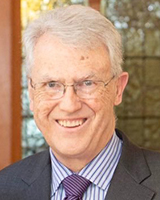IA Institute Advisory Board Members – Biographies

Habib Chaudhury (Chair)
Professor, Department of Gerontology
Associate Director, Gerontology Research Centre
Simon Fraser University
Dr. Habib Chaudhury, Professor and Chair in the Department of Gerontology, has extensive research experience in the field of Environmental Gerontology. His research interests are: physical environment for people living with dementia in long-term care homes, person-centred care, and neighbourhood planning and design for age and dementia-inclusive communities. His projects have been funded by the Public Health Agency of Canada (PHAC), Canadian Institutes of Health Research (CIHR), Social Science and Humanities Research Council (SSHRC), Canada Mortgage and Housing Corporation (CMHC), CapitalCare Foundation and the Centre for Health Design. He has published over 100 peer-reviewed journal articles, book chapters and monographs. Published books include: Environments in an Aging Society: Autobiographical Perspectives in Environmental Gerontology (Annual Review of Gerontology and Geriatrics, Vol 38, 2018; co-edited with F. Oswald), Remembering Home: Rediscovering the Self in Dementia (Johns Hopkins University Press, 2008) and co-edited volume Home and Identity in Later Life: International Perspectives (Springer Publications, 2005; with G. Rowles). Dr. Chaudhury also conducts evidence-based design consultations with organizations and care providers in visioning, planning, design and evaluation of seniors’ housing and long term care homes. He is also affiliated with the Centre for Research on Personhood in Dementia at the University of British Columbia, Vancouver. Dr. Chaudhury is a Fellow of the Gerontological Society of America.

Mohamed-Amine Choukou
Assistant Professor, Department of Occupational Therapy, College of Rehabilitation Sciences, and Adjunct Professor, Biomedical Engineering Program, University of Manitoba
Research Affiliate, Riverview Health Centre & Centre on Aging
Associate Researcher, The Quebec Rehabilitation Research Network (REPAR)
Dr. Amine Choukou is an Assistant Professor in the Department of Occupational Therapy, College of Rehabilitation Sciences, University of Manitoba and an Adjunct Professor in the Biomedical Engineering Graduate Program. He is the founding director of the Rehabilitation Technology Lab, where his team explores how smart technologies and services can help older adults live independently and with dignity, develop interventions to address the burden of caregivers and uncover health care needs. Dr. Choukou's current research programme focuses on the development of smart, non-obtrusive systems and environments to improve the quality of life of patients. He is currently leading multidisciplinary research projects in Canada and Europe in partnership with patients, caregivers and industry. Many of his projects involve collaboration with researchers in the fields of computer science, electrical and computer engineering, architecture and design. As of today, Dr. Choukou has published more than 25 peer-reviewed articles, 6 book chapters and presented his research work at more than 50 conferences around the world. Dr. Choukou graduated from Université Paris Sud with a PhD in Human Kinetics and gained valuable experience in rehabilitation technology in France (SSMMH Doctoral School, Paris) and Quebec (Université Laval/CIRRIS).

Suzanne Dupuis-Blanchard
Full Professor, School of Nursing
Research Chair in Population Aging Université de Moncton
Director, Centre on Aging
Université de Moncton
Dr Suzanne Dupuis-Blanchard is a registered nurse, full professor at the School of Nursing, Research Chair on Population Aging and Director of the Centre on Aging at Université de Moncton. She has worked with older adults for over 32 years, first as a community health nurse and now as a professor researcher.
Her program of research focuses on the multiple facets of aging in place with a special focus on older adults living in Official Language Minority Communities (OLMC). She has provided leadership in the development of a provincial strategy on aging as well as at the national level as past chairperson of the National Seniors Council and past president of the Canadian Association on Gerontology. She has published multiple peer reviewed articles on topics related to aging, book chapters on gerontological nursing and community health as well as conference presentations. Her contributions to aging and nursing have been recognized by the United Nations Healthy Ageing 50 Award, the Canadian Association on Aging Distinguished Member Award, the Canadian Nurses Association 150 nurses for Canada’s 150 years, InnovateNB for innovation in the public sector, the Nurses Association of New Brunswick Research Award, and the New Brunswick Innovation Foundation for innovation in aging research. Dr. Dupuis-Blanchard is a Fellow of the Canadian Academy of Nursing and a Fellow of the Royal Society of Canada. She is also the recipient of an Honorary Doctorate (Huntington University).
She completed a PhD in Nursing from the University of Alberta (2007), a Master of Nursing from the University of New Brunswick (2001) and a Bachelor of Science in Nursing from the Université de Moncton (1991).

Gustavo Duque, MD, PhD
Senior Scientist, Research Institute – McGill University Health Centre
Professor, Department of Medicine, Faculty of Medicine and Health Sciences, McGill University
Dr. Gustavo Duque, MD, Ph.D., FRACP, FGSA is a geriatrician and biomedical scientist with a research interest in the mechanisms, potential therapies, and biomarkers for age-related bone loss, osteoporosis, sarcopenia, osteosarcopenia, and frailty in older persons. He is also studying the effect of vitamin D, exercise, protein and nutraceuticals on bone and muscle mass.
His initial training included Internal Medicine at Javeriana University (Colombia) and Geriatric Medicine, which he completed at McGill University in Montreal (Canada). Subsequently, he obtained his Ph.D. at McGill University in 2003 with a thesis entitled ‘Molecular Changes of the Aging Osteoblast’ under the supervision of Dr. Richard Kremer. Between 2003 and November 2007, he joined the McGill University Medical School faculty as a member of the Division of Geriatric Medicine and as a Researcher at the Lady Davis Institute for Medical Research. In November 2007, he moved to Australia to join the Faculty as Associate Professor and Head of the Division of Geriatric Medicine and Director of the Musculoskeletal Ageing Research Program at Sydney Medical School Nepean -University of Sydney. In 2012, he was promoted to Professor of Medicine at the University of Sydney. Between 2015 and 2022, Dr. Duque was Chair of Medicine and Director of the Australian Institute for Musculoskeletal Science at the University of Melbourne.
In 2022, Dr. Duque assumed the roles of Full Professor, Dr. Joseph Kaufmann Chair in Geriatric Medicine, Director - RUISSS McGill Centre of Excellence for Sustainable Health of Seniors/ Simone & Edouard Shouela (CEDurable), and Principal Investigator at the Bone, Muscle & Geroscience Group of the Research Institute of the McGill University Health Centre (MUHC). He is the Editor-in-Chief of the Journal of Gerontology: Biological Sciences, one of the official journals of the Gerontological Society of America. He is also the Chair of the recently created Canadian Translational Geroscience Network.
As a Geriatrician and Clinician-Investigator, Dr. Duque has implemented several Falls and Fractures clinics (the most recent ones at the MUHC and the Jewish General Hospital in Montreal) where patients are comprehensively assessed for falls and fracture risk. His clinical trials unit conducts several trials testing the effect of pharmacological and non-pharmacological treatments for age-related musculoskeletal diseases. He is the author of more than 300 peer-reviewed articles and multiple book chapters and has edited five books in the aging and musculoskeletal fields.

Carole Anne Estabrooks
Professor & Tier 1 Canada Research Chair
Faculty of Nursing, University of Alberta
Dr. Carole Estabrooks is a health services researcher and holds a Canada Research Chair in Knowledge Translation in the care of older adults in residential long-term care (LTC) settings. She is Scientific Director of the pan-Canadian, longitudinal research program, Translating Research in Elder Care (TREC). She holds a cross appointment in the School of Public Health at the University of Alberta.
She received her undergraduate degree in nursing from the University of New Brunswick, her graduate degrees from the University of Alberta, and completed a postdoctoral fellowship at the Institute for Clinical Evaluative Sciences and University of Toronto. She has been the recipient of several awards and distinctions among them, the Order of Canada (2016), the Betty Havens Prize for Knowledge Translation in Aging (2014), the CAFA Distinguished Academic Award (2010), and the Alumni Award of Distinction, University of New Brunswick (2007). She is a fellow in the Royal Society of Canada (2020), the Canadian Academy of Health Sciences (2007), the American Academy of Nursing (2011), and the Canadian Academy of Nurses (2020).
Dr. Estabrooks is an investigator on numerous studies using observational, pragmatic clinical trial, and social network analysis approaches. She currently leads a study investigating the roles of organizational context and research facilitation in the improvement of workforce and resident outcomes in LTC and an observational study examining the impact of COVID-19 on workforce and resident outcomes in LTC. She co-leads research to establish the routine assessment of quality of life in LTC residents with dementia and to assess the impact of past traumatic stress on resident behaviours and quality of life and on workforce strain.
She has been a member of several advisory boards and panels in the areas of aging, dementia, implementation science and residential long-term care. She is a member of the Canadian Frailty Network.

Lauren Griffith
Professor, Department of Health Research Methods, Evidence, and Impact
McMaster University
Dr. Griffith is a Professor in the Department of Health Research Methods, Evidence, and Impact (HEI) at McMaster University where she holds the McLaughlin Foundation Professorship in Population and Public Health and is an active member of the McMaster Institute for Research on Aging (MIRA). Prior to receiving her PhD in epidemiology from the University of Toronto, she completed her Bachelor of Science degree in pure mathematics and Master of Science degree in biostatistics from the University of Michigan. Dr. Griffith is a Co-principal Investigator of the Canadian Longitudinal Study on Aging (CLSA), the lead of the McMaster CLSA Data Collection Site, and the co-lead of the CLSA Methodology Working Group. Her research interests include physical functioning, disability, and aging, as well as the harmonization of longitudinal data. She has also worked extensively in the areas of multimorbidity and frailty. She has collaborated extensively and authored over 325 peer-reviewed publications. Most recently Dr. Griffith is leading the co-design of PACIFIC, a complex community-based frailty intervention for older post-acute care patients.

Dr. David B. Hogan
Professor, Medicine, University of Calgary
Academic Lead, Brenda Strafford Centre on Aging (O’Brien Institute for Public Health, Cumming School of Medicine, University of Calgary)
Born in Baie Comeau QC, David attended universities in Nova Scotia, Alberta, and Ontario. A specialist in geriatric medicine, after completing his postgraduate clinical training he returned to Dalhousie University where among other duties he served as Associate Dean for Undergraduate Medical Education. He joined the University of Calgary in 1990 where he held the first Canadian University Chair in geriatric medicine, the Brenda Strafford Foundation Chair in Geriatric Medicine, for 25- years. David is now the Academic Lead of the Brenda Strafford Centre on Aging (O’Brien Institute for Public Health, Cumming School of Medicine, University of Calgary). He has served as Chair of the Royal College of Physicians and Surgeons of Canada Specialty Committee in Geriatric Medicine, President of the Canadian Geriatrics Society, and editor of the Canadian Geriatrics Journal. David has authored over 320 peer-reviewed publications reflecting his long-standing interest in aging studies that focus on topics such as clinical geriatrics, cognitive impairment and dementia, falls, and frailty. David has been the Local Principal Investigator for the Calgary Data Collection Site of the Canadian Longitudinal Study on Aging (CLSA) since the start of the study in 2010. He also formerly held leadership roles and is an investigator in the Canadian Consortium on Neurodegeneration in Aging (CCNA).

Georges Lévesque
Deputy Director & Professor, Department of Psychiatry and Neuroscience, Faculty of Medicine, Laval University
Researcher, CHU de Québec
Dr. Georges Lévesque received his B.Sc. in Biochemistry from the Université du Québec à Montréal (UQAM). He continued his studies at Laval University, where he obtained a certificate in pedagogy, a Master’s degree in medical biochemistry, and a Ph.D. in cellular and molecular biology. He then embarked on a postdoctoral fellowship on the molecular genetics of Alzheimer’s disease at the Centre for Research in Neurodegenerative Diseases at the University of Toronto. He is a co-discoverer of the presenilin 1 and 2 genes, along with their mutations that lead to the development of an early, familial form of Alzheimer’s disease. Dr. Lévesque received the first Frist-Jus Memorial Award for Neurodegenerative Disease Research from the University of Toronto. He joined Laval University in late 2001. He is deputy Director and Full Professor in the Department of Psychiatry and Neuroscience of the Faculty of Medicine and continues his basic research activities on Alzheimer’s disease within the neuroscience axis of the CHU de Québec. Dr Levesque has published more than 90 manuscripts/book chapters/abstracts in Alzheimer’s disease research field, chaired the biomedical review panel of the Alzheimer Society of Canada, chaired the CIHR biological and clinical aspects of aging (BCA) committee and served on several committees from funding agencies related to aging and Alzheimer’s disease.
Dr. Lévesque’s research interests focus on the molecular aspects of Alzheimer’s disease. This disease is characterized by the degeneration of the central nervous system. The biochemical mechanisms leading to Alzheimer’s disease are not fully known. However, it is well known that accumulation of toxic forms of both amyloid and Tau (neurofibrillary tangles) contribute to the disease. Dr. Lévesque began developing a new therapeutic molecule, a ribozyme, to reduce levels of amyloid and Tau mRNAs and in turn block the accumulation of these toxic molecules, which are responsible for neuronal degeneration. His team succeeded in creating a ribozyme against amyloid. Since removing amyloid alone do not provide significant cognitive benefit, Dr Lévesque is now creating a ribozyme against Tau mRNA. It is expected that combining the 2 ribozymes will mitigate cognitive deficits in Alzheimer’s pathology. His team is also studying the biochemical pathways by which the mutated form of presenilin leads to the degeneration of nerve cells and an aggressive form of Alzheimer’s disease.

Jim Mann
Advisory Council Member of Research Ethics BC
Member of AGE-WELL NCE Research Management Committee
Focus Group Member of World Health Organization’s (WHO) Global Dementia Observatory (GDO)
Since his diagnosis of Alzheimer's in 2007, Jim has been active as a researcher, and in the community to reduce the stigma of Alzheimer's Dementia, increase awareness, and promote the possibilities of a positive and meaningful life after a diagnosis of dementia.
In recognition of his advocacy to reduce the stigma of Alzheimer’s disease and other forms of dementia, and for promoting an inclusive society in which persons with dementia can make a positive and meaningful contribution, Jim was awarded an honorary Doctor of Laws degree from the University of British Columbia.
Jim has been an active member of numerous boards and research initiatives, including the Alzheimer Society of B.C. (ASBC), and the Alzheimer Society of Canada’s (ASC) Board of Directors. While serving with ASC, he was co-chair of a Canada-wide advisory group of people living with dementia that led to the development of both an ethical framework and a guide for meaningfully engaging people with dementia, as well as the Canadian Charter of Rights for People with Dementia. During his six-year term on the Board, he supported the sustainability and growth of the Society’s Research Program.
He was one of two members with dementia on the Federal Ministerial Advisory Board on Dementia, which was responsible for the development of Canada’s first national dementia strategy in 2019 entitled A Dementia Strategy for Canada ~ Together We Aspire. As part of the 25th Anniversary Celebration of the W. Maurice Young Centre for Applied Ethics at the University of British Columbia in 2019, Jim was invited to be a visiting community research partner where he focused on issues of consent and ethics in dementia research.
Jim is currently an Advisory Council member of Research Ethics BC, a member of the AGE-WELL NCE Research Management Committee, and a focus group member of the World Health Organization’s (WHO) Global Dementia Observatory (GDO).
Current research projects include a focus on technology and the use of robots connecting family with residents in long-term care, which he co-leads, the reduction [and flipping] of dementia-related stigma and the promotion of social inclusion of people with dementia, for which he is co-principal investigator, and investigating consent and engagement in research with people with dementia, where he is Collaborator.
Jim is a published author including publishing solely and with other researchers in respected academic journals. He wrote the Foreword to the texts Broadening the Dementia Debate and Life at Home for People with a Dementia, and he co-authored chapters in two texts, Medical Research Ethics: Challenges in the 21st Century (2022), and Everyday Citizenship and People with Dementia (2019), and he has authored/co-authored 27 papers.
Since his diagnosis of Alzheimer's, Jim has appeared before parliamentary committees, been interviewed for podcasts and webinars. He has given hundreds of presentations throughout Canada, many of which include the importance of people with lived experience as partners in research and ensuring people with lived experience see and feel confident in their role as research participants.
Best of all, he has had the honour of meeting and working alongside many researchers, academics, other older adults, and people living with dementia who, together, have contributed to his learning, and who have challenged him and in turn, he has challenged.

Mario Masellis, M.Sc. (Pharm), MD, PhD, FRCPC
Clinician Scientist and Professor of Medicine (Neurology)
Sunnybrook Health Sciences Centre
University of Toronto
Dr. Mario Masellis obtained his MSc in Pharmacology from the University of Toronto in 1997, completed his medical training at the University of Toronto in 2001 and obtained his board certification (FRCP Canada) in Neurology since 2006. He has completed a clinical research fellowship in Cognitive & Movement Disorders Neurology in 2008 and obtained a PhD in Clinical Neurosciences in 2012.
His clinical expertise is in the diagnosis and management of both Alzheimer’s and non-Alzheimer’s dementias, including Parkinson’s / Lewy body disorders, frontotemporal dementia, progressive supranuclear palsy and corticobasal syndrome.
His research focuses on how genomic factors impact neuroimaging, biomarker and cognitive phenotypes, as well as response to drugs in neurodegenerative diseases – both sporadic, late-onset and genetic, early-onset subtypes. His work has been published over 300 peer-reviewed articles in high impact journals including Brain, JAMA Neurology, Neurology and Alzheimer’s & Dementia. He was the co-lead of the Ontario Neurodegenerative Disease Research Initiative and he currently co-leads the Theme 2 of the Canadian Consortium on Neurodegeneration in Aging. He serves as a member of the International Parkinson’s and Movement Disorders Society Neuroimaging Study Group, and International Dementia with Lewy Bodies (DLB) Consortium. He is the national principal investigator of the Canadian arm of the Genetic Frontotemporal Dementia Initiative (GENFI) and oversees the conduct of this project in Canada. He has received several awards for his work and he has recently received over 1 million Euros for a Joint Program in Neurodegenerative Disease (JPND) grant as the coordinating international investigator.

Delores Mullings
Vice Provost - Equity Diversity Inclusion and Anti-Racism, Memorial University
Administrative Director – Memorial University
Dr. Delores V. Mullings rests on the shoulders of her African Ancestor who have paved the way enabling her to be the first among many firsts. She is a member of a large extended family, the mother of two living Black queens, sister, friend and second daughter of Maddah Mullings, her original feminist who continues to teach her much. She is the first Black person, and still the only Black woman to be hired in the School of Social Work and appointed to a senior administrative position at Memorial University. In her role as Memorial’s inaugural Vice Provost Equity Diversity Inclusion and Anti-Racism (EDI-AR) she provides leadership to create, implement and sustain EDI-AR policies and infrastructure to help transform Memorial into and EDI-AR model worldwide. She brings with her over 40 years of resistance work in organizational change, climate scan, strategic planning as well as anti-racist and decolonizing efforts. She is known to leave a trail of sparks behind to ignite racial justice efforts.
Her interdisciplinary scholarship explores decolonizing post-secondary education, mothering, mental health and wellness, LGBTQ+ concerns, the Black Church, elders, migration and community engagement using critical pedagogies, in particular, anti-Black racism, Africentric theory and critical race theory.
Current research includes Improving COVID-19 vaccine confidence and uptake among Black Canadians, Black youth mental health after COVID-19; community inclusion in small urban centres, Anti-racist accessibility assessment tools and Health Research Training Platform. She is the lead editor on a recently published text Africentric Social Work (Fernwood) and a forthcoming anthology Black People’s Resilience During COVID-1.9
Dr. Mullings has provided unpaid expert contribution to various national and provincial associations and institutions including Canadian Institute of Health Research in the Institute of Aging supporting the work of the Older Adult Advisory Council, YWCA Canada Board of Directors, Black Canadian Studies Association, (Vice President), Halton Children’s Aid Society, One Vision One Voice Race Equity Practice Advisory Committee and board member of Opera on the Avalon and an advisory member to the International Journal of Educational Development in Africa.
For selfcare, and attention to self, she enjoys walking, gardening and writing poetry.

John Muscedere, MD, FRCPC
Professor, Queen’s University
Clinician Scientist, Queen’s University and Kingston Health Sciences Centre
Dr. John Muscedere MD, FRCPC is a Professor of Medicine, Intensivist and Clinician Scientist at Queen’s University and Kingston Health Sciences Center. Dr. Muscedere’ s research focuses on improving outcomes by generating new evidence and knowledge translation through clinical trials, systematic reviews and meta-analyses focusing on nosocomial infections and frailty. He is the Principal Investigator for FAST-3, an international, multi-center, CIHR funded trial studying inhaled furosemide for the treatment of acute hypoxemic respiratory failure. He is the Scientific Director for the Canadian Frailty Network (CFN). CFN is dedicated to improving care for older Canadians living with frailty through the generation of new knowledge, knowledge mobilization, partnerships and training highly qualified personnel. CFN is developing public health initiatives for the prevention and mitigation of frailty through Regional Centers for Healthy Aging.

Maria Natasha Rajah, Ph.D.
Full Professor in the Department of Psychiatry, McGill University
Researcher at the Douglas Research Centre
CIHR Sex & Gender Research Chair in Neuroscience, Mental Health and Addiction
Dr. M. Natasha Rajah received her Ph.D. in Experimental Psychology from the University of Toronto, St. George Campus, and did her post-doctoral training at the Helen Wills Neuroscience Institute, University of California at Berkeley. She joined the Department of Psychiatry at the Faculty of Medicine at McGill University and Douglas Research Centre in 2005. She has been the recipient of several honors including the CIHR New Investigator Salary Award, FRQS Junior 2 Researcher Award, Women in Cognitive Science Canada Mentorship Award and the McGill Faculty of Medicine Haile T. Debas Prize. She is a member of the Memory Disorders Research Society (MDRS), Consortium for Neurodegeneration and Aging (CCNA), Consortium Québécois for early identification of Alzheimer’s disease (CIMA-Q), McGill Centre for Studies in Aging, the PREVENT-AD Research Group at McGill University, and serves on the Executive Board of the Canadian Association of Neuroscience.
Dr. Rajah has received research support from CIHR, NSERC, SSHRC and the Alzheimer’s Society of Canada and has published more than 65 peer review manuscripts and chapters. Her research focuses on the cognitive and clinical neuroscience of memory, brain aging, and dementia prevention. She uses behavioral, neuropsychological, physiological, and brain imaging (MRI) methods to investigate how the human brain learns and remembers past events in rich detail (episodic memory); and how aging, biological sex, gender, and reserve factors impact cognition and brain network dynamics in adults with and without risk factors for late-onset sporadic Alzheimer’s Disease. Her research program also focuses on developing more representative models of brain aging and cognition that can generalize across communities. Her work has helped advance our understanding of the neural basis of age-related cognitive decline, and has highlighted the importance of studying middle-aged adults, and using a sex, gender, and intersectional analysis approach (SGBA+).

Dr. Samir K. Sinha, MD, DPhil, FRCPC, AGSF
Director of Geriatrics, Sinai Health System and the University Health Network
Peter and Shelagh Godsoe Chair in Geriatrics, Mount Sinai Hospital
Director of Health Policy Research at the National Institute on Ageing, Ryerson University
Dr. Samir Sinha is a passionate and respected advocate for the needs of older adults. Dr. Sinha currently serves as the Director of Geriatrics of the Sinai Health System and the University Health Network in Toronto, the Peter and Shelagh Godsoe Chair in Geriatrics at Mount Sinai Hospital, and the Director of Health Policy Research at the National Institute on Ageing at Ryerson University. He is also a Professor in the Departments of Medicine, Family and Community Medicine, and the Institute of Health Policy, Management and Evaluation at the University of Toronto and an Assistant Professor of Medicine at the Johns Hopkins University School of Medicine.
A Rhodes Scholar, after completing his undergraduate medical studies at the University of Western Ontario, he obtained a Masters in Medical History and a Doctorate in Sociology at the University of Oxford’s Institute of Ageing. He has pursued his postgraduate training in Internal Medicine at the University of Toronto and in Geriatrics at the Johns Hopkins University School of Medicine.
Dr. Sinha’s breadth of international training and expertise in health policy and the delivery of services related to the care of the elderly have made him a highly regarded expert in the care of older adults. In 2012 he was appointed by the Government of Ontario to serve as the expert lead of Ontario’s Seniors Strategy and he is now working on the development of a National Seniors Strategy. In 2014, Canada’s Maclean’s Magazine proclaimed him to be one of Canada’s 50 most influential people and its most compelling voice for the elderly. Dr. Sinha was recently appointed to serve as a member of the Government of Canada’s National Seniors Council, and is also leading the development of new National Long-Term Care Standards for Canada.
Beyond Canada, Dr. Sinha is a Fellow of the American Geriatrics Society and a member of the American Red Cross Scientific Advisory Council. Dr. Sinha has further consulted and advised hospitals and health authorities in Britain, China, Iceland, Singapore, St. Kitts and Nevis, Taiwan and the United States on the implementation and administration of unique, integrated and innovative models of geriatric care that reduce disease burden, improve access and capacity and ultimately promote health.
- Date modified: